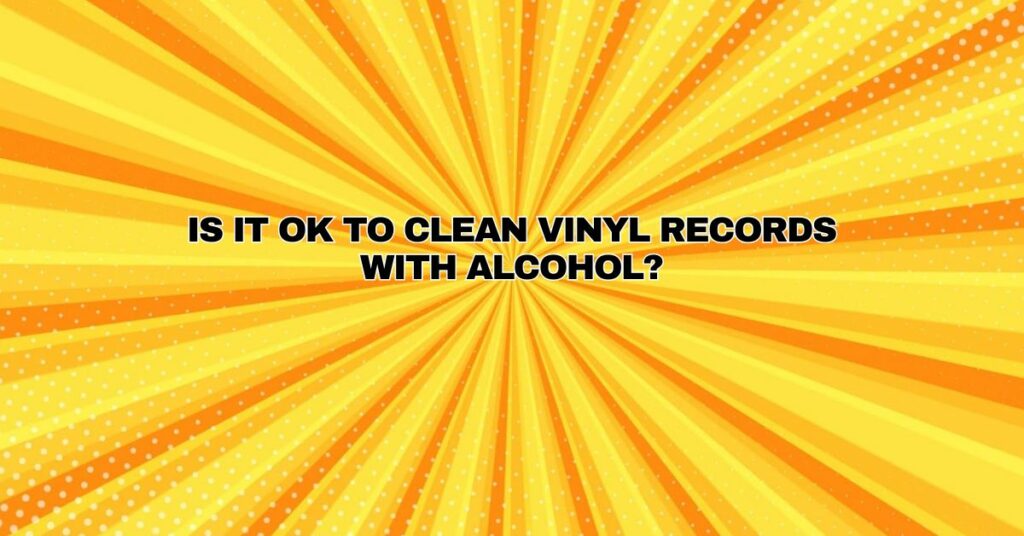Cleaning vinyl records is an essential practice for maintaining their sound quality and prolonging their lifespan. While there are various cleaning methods and solutions available, using isopropyl alcohol is a common approach among vinyl enthusiasts. In this comprehensive guide, we will explore the pros and cons of cleaning vinyl records with alcohol, provide step-by-step instructions, and discuss best practices to ensure your cherished vinyl collection remains in excellent condition.
1. Using Alcohol to Clean Vinyl Records
Isopropyl alcohol, commonly known as rubbing alcohol, is often used by vinyl collectors to clean records due to its effectiveness at removing contaminants. Here are the key advantages of using alcohol for vinyl record cleaning:
- Effective Contaminant Removal: Alcohol can effectively dissolve and lift surface contaminants such as fingerprints, smudges, and certain types of dirt and grime.
- Affordability: Isopropyl alcohol is readily available, inexpensive, and can be found in most households.
2. The Right Type of Alcohol
When using alcohol to clean vinyl records, it’s crucial to choose the correct type:
- High-Purity Isopropyl Alcohol: Select isopropyl alcohol with a high purity level, preferably 90% or higher. Lower-purity alcohols may contain impurities or additives that can leave residues on the record.
- Avoid Denatured Alcohol: Denatured alcohol, which contains additives to make it undrinkable, should be avoided, as these additives can be harmful to your vinyl records.
3. Crafting a Cleaning Solution
To create an effective cleaning solution for vinyl records using isopropyl alcohol, follow these steps:
- Gather Supplies: You will need high-purity isopropyl alcohol (90% or higher), distilled water, and a clean spray bottle.
- Mixing the Solution: In a clean container, combine the isopropyl alcohol and distilled water in a 1:4 ratio (one part alcohol to four parts distilled water). This ratio ensures that the solution is gentle enough for your records.
- Shake Well: Gently shake the container to ensure the alcohol and water are thoroughly mixed.
- Transfer to Spray Bottle: Pour the solution into a clean spray bottle for easy application.
4. Cleaning Vinyl Records with Alcohol
Here are step-by-step instructions for cleaning vinyl records with the alcohol solution:
- Prepare the Workspace: Choose a clean and clutter-free workspace to avoid contamination. Wash your hands thoroughly to remove oils and dirt.
- Dust Removal: Use a carbon fiber brush to gently remove surface dust and debris from the record. Brush along the grooves in a circular motion.
- Application of Alcohol Solution: Spray a small amount of the alcohol solution onto a clean, lint-free microfiber cloth. Do not spray the solution directly onto the record.
- Cleaning Motion: Gently wipe the record’s surface in the direction of the grooves, using a circular motion. Avoid applying excessive pressure.
- Rinse and Dry: Use a separate clean, dry microfiber cloth to wipe away any remaining cleaning solution residue. Ensure the record is completely dry before playing.
- Storage: After cleaning, store the record in a clean, protective inner sleeve and outer sleeve to prevent recontamination.
5. Conclusion
Cleaning vinyl records with alcohol can be an effective and cost-efficient method for removing surface contaminants and maintaining your vinyl collection. By using high-purity isopropyl alcohol and following the steps outlined in this guide, you can ensure that your cherished records remain in excellent condition and continue to provide a pristine listening experience for years to come. However, it’s essential to exercise caution, choose the right type of alcohol, and avoid using denatured alcohol to prevent potential damage to your vinyl records.


